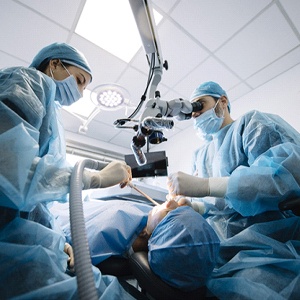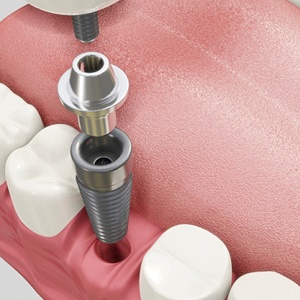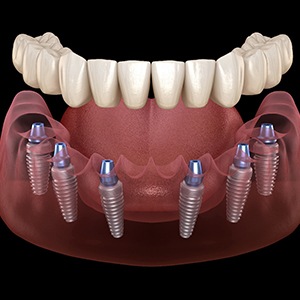Dental Implants – Mineola, NY
Building a Firm Foundation for Your New Smile
If you’re tired of having to work around your missing teeth every day, or you’re frustrated with an uncomfortable denture that causes more problems than it solves, then dental implants from our Mineola, NY, dentist may just be the solution you have been waiting for. These offer the next best thing to natural teeth, and at Meadowbrook Dental Care, our team can provide every part of the dental implant procedure in-house so that rebuilding your smile is easy, convenient, and guaranteed to deliver a result you’ll love. Call us today to learn more.
Why Choose Meadowbrook Dental Care for Dental Implants?
- All-Inclusive Dental Implant Care
- Soothing Sedation Options
- Custom-Designed Treatment for Each Patient
What Are Dental Implants?

When a tooth goes missing, it’s not just the visible crown that disappears but the root structure below the gumline as well. A dental implant replaces this root using a small titanium post that is positioned within the jawbone. There, it melds with the adjacent bone, and then it can be topped with a restoration such as a crown, bridge, or denture, essentially bringing back the entire tooth.
The 4-Step Dental Implant Process

Dr. Casañas holds specialized training specifically for dental implant placement and restoration, allowing him to complete every step of treatment under one roof. He’s happy to break down each step of treatment to you directly so you can feel comfortable ahead of your surgery. Dental implants are pretty straightforward, but they do require multiple steps to complete. Ahead of your initial consultation, we encourage you to learn more about how dental implants work below!
Initial Dental Implant Consultation
Before you can begin treatment, you’ll need to complete a dedicated dental implant consultation ahead of time so we can determine your eligibility. At this initial visit, our team will examine your mouth, discuss your replacement options, and let you know if dental implants would be a good fit for you. In some cases, bone grafts, sinus lifts, tooth extractions, gum disease therapy, or another preparatory treatment may be needed beforehand. These services can prolong the length of the treatment process but are essential to ensuring the most successful outcome possible.
Dental Implant Surgery

Once you are approved for dental implants, Dr. Casañas will surgically place your new roots into your jawbone. To place the implants, he administers an anesthetic directly into the gum tissue as well as areas near the gap in your smile to ensure no sensations are felt during surgery. Then, a small incision is created in the gum tissue to access the bone. Next, a tiny hole is created for the implant to fit inside, then the implant is placed. Finally, the gum tissue is stitched closed so it can begin to heal. While a single implant can take an hour or so to place, replacing multiple implants at a time will further extend the length of your surgery.
Dental Implant Osseointegration & Abutment

The implant is made from titanium, which is a biocompatible material designed to fuse with organic structures within the body. However, it will still take 3-6 months for your prosthetic root to attach to your jawbone. During this time, you’ll wear temporary teeth to keep the gap closed, especially if you are replacing teeth visible in your smile. When the implant has finished the osseointegration process, you’ll come back to our office to have an abutment attached. This connector is meant to give the permanent restoration the foundation it needs to remain stable for decades to come.
Delivery of Dental Implant Restoration(s)

When your mouth is ready, you’ll return to our dental office to have your new teeth attached to your implants. The restoration is created using our digital impression system, a dental technology that captures pictures of your mouth and uses them to create a 3D model. This model is the blueprint for your future restoration, ensuring it fits comfortably, keeps the bite even, and looks incredibly natural. The restorations are made from materials that are not only designed to look lifelike but blend in with existing teeth.
Benefits of Dental Implants

Since dental implants bring back every part of missing teeth, they provide distinct advantages over conventional dentures and dental bridges. Essentially, implants fulfill all of the functions of real teeth, to the point that they look and feel indistinguishable from the pearly whites you lost. It’s no surprise that more than half a million people choose to receive implants each year! Below, you’ll find a few of the day-to-day, health, and long-term benefits of dental implants in Mineola. Then, when you’re ready to experience them for yourself, just give us a call!
Day-to-Day Benefits

- Appearance – No one will be able to tell that you have artificial teeth because your new ones are customized to complement your facial features. A casual observer will only see a beautiful smile.
- Security – Just like your real teeth, dental implant posts are held firmly within your jawbone. You can enjoy peace of mind knowing that your prosthetic won’t create awkward, embarrassing moments by slipping out of place.
- Diet – Because of their stability, dental implants in Mineola restore all of the chewing strength that you used to have. You’ll be able to eat whatever you like, unlike traditional dentures that severely limit your diet.
Health Benefits

- Jawbone health – Bone loss in the jaw is common after one or more teeth have been lost. Dental implants actively prevent this by stimulating the bone. As a result, your jawbone remains strong, and your face maintains a healthy, youthful shape.
- Dental health – Placing a regular dental bridge requires the teeth on either side of the gap to be shaved down for support. Eventually, these teeth become more susceptible to breakage, decay, and sensitivity. Dental implants are self-supporting and allow you to preserve more of your natural tooth structure.
- Overall health – Dental implants reduce the risk of gum disease. Because gum disease has been linked to cardiovascular issues, diabetes, and other medical problems, dental implants can help you maintain better whole-body health.
Long-Term Benefits

- Longevity – Dental implants have an impressive 30+ year lifespan (compared to the average of seven to ten years for traditional bridges or dentures). Even better, they don’t require any special maintenance; regular oral hygiene and checkups with an implant dentist in Mineola are all you need to do to keep your new teeth in pristine condition.
- Reliability – The popularity of dental implants is in large part due to how reliable they are. When they’re placed by a professional, and you take good care of them, they’re successful in more than 95% of cases, even after a decade or longer.
- Savings – Admittedly, dental implants come with a higher initial price tag than dentures and bridges. However, they can actually save you money in the long run! Conventional prosthetics need to be adjusted or replaced frequently, so you’d end up having to spend more money (and time) over the years than you would with dental implants, which should be a one-time investment that pays for itself several times over!
Who Dental Implants Can Help

Dental implants are held up as the gold standard for tooth replacement, but we do need to confirm that you’re a candidate for the procedure before we commit to using implants to fill the gaps in your smile. The good news is that dental implants can help virtually anyone with a healthy mouth no matter how many teeth they’re missing. We can discuss the state of your gums and jawbone during your initial consultation as well as what the implant process will be like.
Who Is a Good Candidate for Dental Implants?

You need to meet the conditions below to be considered for implants:
- You must either have already lost at least one tooth or have teeth that need to be removed.
- You need to be healthy enough that your mouth can heal properly after oral surgery has been performed.
- You must not have gum disease or cavities. (If you do, you may be eligible for dental implants after you’ve been treated.)
- You must have a jawbone that’s strong enough to support dental implants. (Bone grafting can increase your jawbone density if needed.)
- All of these factors will be taken into account during your initial consultation. Your final treatment plan will reflect your oral health needs.
Missing 1 Tooth

It’s relatively easy to replace one missing tooth with an implant. Only a single implant post is needed to fill the space. A crown will be fixed to the implant much in the same way that it might be attached to an injured tooth. An implant can be placed without removing enamel from other teeth, and it is rooted in the jaw in much the same way a natural tooth is. This makes it sturdier, longer-lasting, and more conservative than a dental bridge. Also, the crown can be personalized to create a beautiful smile that looks as natural as possible.
Missing Multiple Teeth

It’s more efficient to replace multiple teeth with a single restoration and a small number of implants than it is to get an implant and crown for each tooth. One option is to get two dental implants to support a dental bridge. This can be done if at least three consecutive teeth are missing. We can also provide implants for partial dentures; the prosthetic will be made to fit in the gaps of your smile, and a specific number of implants will be used to support it.
Missing All Teeth

Full dentures allow you to replace all of your teeth. It actually does not take many dental implants to support a full denture; usually anywhere between 4 to 6 implant posts are enough. Implant dentures are extremely stable and will not move while you’re speaking or laughing. They will also make it easier to eat foods such as steak that give traditional denture wearers trouble. And since your prosthetic won’t have to be removed for cleanings, your oral hygiene routine won’t change much; you can keep brushing and flossing like you always have.
Understanding the Cost of Dental Implants

The cost of your dental implant procedure will depend on a few key factors, namely how many teeth you need to replace, what kind of restoration will be used, and the position of the implants within the mouth. We’ll cover all of these details during your initial consultation, and we’ll also discuss how you can use financing to break up the price so that your treatment is easily affordable. Until then, you can read on to learn more about the cost of dental implants in Mineola.
Get An Instant Implant Estimate
Preliminary Treatments & Dental Implant Surgery

Any preliminary treatments that you need, including bone grafting, gum disease therapy, or tooth extractions, will increase the overall cost of your implants. While these services do add to the cost, they are integral for the success of your new smile, plus many are partially covered by dental insurance. Your surgery will incur its own cost, which will depend on the location of the implant and anesthesia used. Thankfully, we offer the entire process under one roof, keeping your fees compact and simple.
The Parts of Your Dental Implant

Several factors will impact the cost of your implants, including:
- Number of dental implants: One implant for one missing tooth will cost less than replacing an entire smile. However, our implant dentist in Mineola only needs 4 to 6 implants to replace an arch of teeth, providing a cost-effective solution.
- Type of restoration: Crowns, bridges, and dentures each have different costs – the smaller your restoration, the lower your fee will typically be.
- Size: Some implants are designed to be longer or shorter based on your needs, which will affect your total treatment price.
- Brand of dental implant: Some implant manufacturers are better than others, like cars or clothes. We are always transparent about the high-quality dental implants that we offer.
How Dental Implants Can Save You Money

While dental implants in Mineola tend to cost more initially, they can help keep your pocketbook full in the long run. Unlike dentures or bridges that must be replaced every 5 to 10 years, dental implants can last for decades, or even the rest of your life. This saves you precious time and money by avoiding replacements and the dental visits that come with them. Additionally, dental implants stimulate the jawbone to prevent it from deteriorating, which helps you keep the healthy teeth you may still have.
Does My Dental Insurance Cover Dental Implants?

Usually, dental implants are not covered by insurance; however, there are a few exceptions. We are always happy to review your plan and maximize any benefits you may have. In some cases, portions of your treatments like preliminary dental care or final restorations will be partially covered. Every plan is different, which is why we advise that you contact us or speak with your dental insurance directly before making any decisions.
Making Dental Implants Affordable

If you don’t have insurance, we have a solution that might be right for you! At Meadowbrook Dental Care, we want our patients to have access to high-quality, affordable dentistry. That’s why we have our own in-house dental savings plan, allowing you to get discounts on services like dental implants that insurance would never offer. Plus, we have alternative financing through CareCredit, giving patients low-interest monthly payment options.
Maintaining & Caring for Your Dental Implants

With dental implants, you’ll enjoy a tooth replacement that can easily last for decades, if not for a lifetime. However, this is only true if you take good care of them! On the bright side, dental implant care in Mineola is quite similar to that of natural teeth. To keep your new pearly whites in great condition, just practice these five basic steps.
Make Oral Hygiene a Priority

Poor oral hygiene is the most common reason why dental implants fail, as it increases the risk of infection in the tissues that support the implants. Luckily, you can easily minimize your risk as long as you:
- Brush your teeth (real and implant-supported) twice a day.
- Floss at least once a day.
- Drink plenty of water, as it washes away food debris and bacteria while encouraging saliva production.
- Rinse with a therapeutic mouthwash regularly.
Eat a Healthy Diet

Dental implants are strong enough to chew practically any food. Just like with real teeth, though, some foods are healthier for them than others. If you eat too many sugary or starchy items, you run the risk of bacteria accumulating and wreaking havoc on your new smile. Instead, maintain a diet rich in nutrients that promote oral health, like calcium and vitamin C. Apples, leafy greens, and yogurt are all examples of foods that can keep your mouth healthy.
Break Bad Habits

Whether you smoke it, chew it, or vape it, tobacco significantly increases the risk of dental implant failure (as well as multiple other health problems). Not only does it make gum disease more likely to develop, but it also slows healing, making it harder for your body to fight off any infections that occur. Making the effort to quit smoking will be well worth it!
Additionally, avoid using your teeth for anything besides chewing food. Many people chew on pen caps or bite their fingernails when they’re stressed, and it can seem convenient to open a bottle or a package with your teeth. However, these habits can all too easily damage your implants as well as your remaining teeth.
Protect Your Dental Implants

Do you play sports? Then you’ll want to ask your implant dentist in Mineola about a custom mouthguard, which protects your pearly whites from sports-related injuries much more effectively than any products you’ll find in stores. This minimizes the chance that a sudden blow to the face could harm your implants.
Do you often wake up with a sore jaw? You might be grinding your teeth while you sleep. This habit could wear down your natural tooth enamel as well as your dental implant restorations, leaving them more susceptible to breakage. Wearing a custom nightguard to bed can create a barrier that protects against damage from grinding.
Schedule Regular Dental Checkups

Everyone, regardless of how many natural teeth they have left, should come in for a dental checkup and cleaning every six months. Our dentists will closely examine your mouth for troublesome signs that you may not have even noticed yourself. From there, we can address them right away, which prevents them from becoming more time-consuming and expensive to treat later on.
Dental Implant Post-Op Instructions

Dental implant placement requires only minor oral surgery, but one that needs to be completed precisely by a highly trained professional. Many practices need to refer their patients to an outside specialist for this step, but at Meadowbrook Dental Care, we will handle every step of your treatment personally. Thanks to his advanced training, Dr. Casañas can perform your dental implant placement surgery right here in the office! Afterward, we’ll give you detailed instructions on how to care for your smile during the recovery process. Below, you’ll find some of the most important dental implant post-op information to keep in mind!
What to Do Directly After Dental Implant Surgery

Many patients take at least a day or two off from work, school, and strenuous activities after dental implant surgery to rest. Some patients feel quite tired afterward, while those who opted for powerful forms of sedation, like oral conscious sedation or IV sedation, may also need a little extra time to recover. Here are some basic steps you should follow the first few days after your surgery:
- Take the pain medication we prescribed for you as instructed
- Stay hydrated, but don’t use a straw or drink anything hot, carbonated, or spicy
- Don’t touch the surgical site with your fingers or tongue
- Brush carefully around the surgical site and don’t spit forcefully
Common Side Effects When Recovering from Dental Implant Placement

There are several side effects that you should expect to experience during the week or so following your surgery. Slight bleeding, swelling, and discomfort are normal and will gradually disappear on their own. In the meantime, you can use ice packs, gentle pressure, and prescribed/recommended pain relievers to manage your symptoms.
If you feel that the bleeding, swelling, or discomfort in your mouth isn’t getting better, or if you’re concerned that it’s getting worse, don’t hesitate to get in touch with us right away!
Your Diet After Dental Implant Surgery

A soft, nutritious diet is best after dental implant surgery. It’s important to avoid chewing as much as possible to keep the blood clot in place and prevent tissue irritation. While there are plenty of options to choose from, some popular, post-surgery soft foods include:
- Mashed potatoes
- Scrambled eggs
- Pasta
- Yogurt
- Cottage cheese
- Applesauce
- Smoothies
- Ice cream
- Pudding
Post-Op Health & Oral Hygiene

Post-op oral hygiene is essential for the recovery period. You need to keep your smile clean and free of bacteria to ensure the integration process goes smoothly, but at the same time, you need to be careful around the implant site in order not to disturb the blood clot or healing tissues. A few good tips to keep in mind include:
- Continue brushing your teeth as you normally would the day after your implant surgery. Just be very gentle and careful around the surgical site.
- Rinse your mouth regularly with water, saltwater, or a prescription mouthwash, but do not spit out forcefully.
- Avoid mouthwash with alcohol in it.
What to Do After Your New Teeth Are Attached

While you’ll likely feel back to your normal self in a matter of weeks after your dental implant surgery, your jawbone will continue to heal for several months. Once osseointegration has been completed and your dental implant is seated firmly in the bone tissue, it will be time to have your brand-new teeth attached! At first, you may experience a slight amount of gum sensitivity, but that should go away very quickly.
Dental Implant Failure & Salvage

Although dental implants boast an impressive success rate of more than 95%, there’s still a small chance that they could fail. If you notice any problems that could indicate dental implant failure, such as swelling, intense pain, or a feeling that your implant is loose, please contact us immediately. The sooner we can see you, the more likely we’ll be able to save your new smile with dental implant salvage.
Learn More About Dental Implant Failure & Salvage
Dental Implant FAQs
Does Getting Dental Implants Hurt?
Dental implants do require minor oral surgery. Small incisions are made in your gums, and your dental implants are placed within your jawbone. As a result, you can expect some minor soreness and discomfort in the days following your procedure. However, your implant procedure should involve no pain. In fact, your implant dentist in Mineola will administer local anesthesia to ensure you are numb before beginning the process of placement. This will help you to feel no discomfort throughout your surgery and allow you to remain calm and comfortable.
Am I Too Young to Get Dental Implants?
When it comes to dental implants and age, the only stipulation is that the development of your jawbone must be complete. While you may never be considered “too old” for dental implants, most dentists will not agree to place them in patients younger than 18. In most cases, it is best to wait until you are at least in your mid-20s before seeking this type of tooth replacement. Jawbones develop at various ages and rates, so depending on our findings, we may suggest you move forward with an alternative form of treatment until your jawbone is finished developing.
How Long Does Dental Implant Surgery Take?
The average timeframe for the placement of a single dental implant is between one to two hours. However, if you are having multiple or an entire arch of teeth replaced and require two, four, or even six dental implants, this process can take much longer. You’ll need to make sure you go ahead and take the day off from work, as well as another day or two, to ensure you are not rushing yourself or the healing process. Many patients receiving an implant bridge or implant denture often need three or four days to recover, so it’s recommended that if you fall into this category, you schedule your procedure for a Thursday or Friday to have the weekend to heal.
Will People Be Able to Tell I Have Dental Implants?
Fortunately, no, your dental implants will blend in seamlessly with the rest of your smile. Digital impressions are necessary to ensure your customized prosthetic is designed to properly fit inside your mouth and along the arch. Using the specifications provided by our dental team, your new teeth will match the size, shape, and color of your existing teeth. And because dental implants mimic the natural tooth structure and are placed inside the jawbone, they will appear just like the rest of your smile, making it virtually impossible for anyone to tell the difference.
